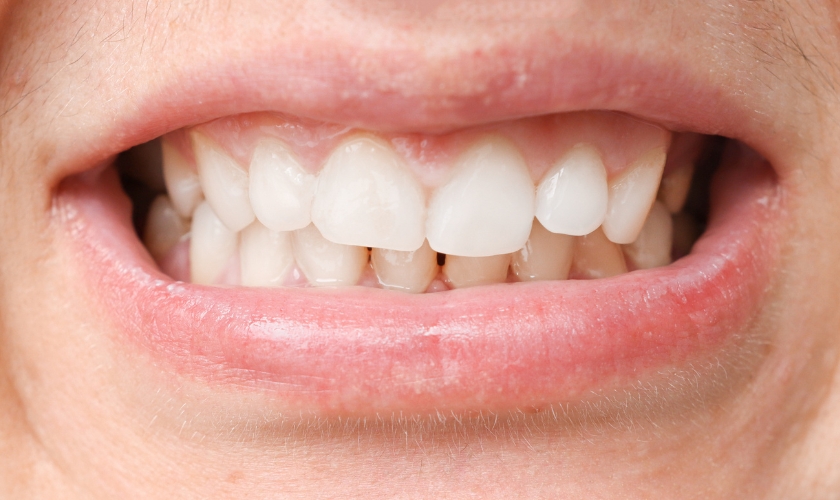What is a crossbite? Signs, effects, and treatment
Imagine a healthy smile. Your upper teeth gently overlap the lower teeth, creating a balanced bite. Now, picture the opposite. That’s a crossbite, a common dental misalignment where some upper teeth sit inside the lower teeth. Don’t worry, though! Crossbites are treatable, and a straighter smile awaits. Let’s delve into what crossbites are, the signs to watch for, and how an Invisalign dentist can help.
Decoding the Misalignment: What is a Crossbite?
A crossbite occurs when one or more upper teeth bite down inside the lower teeth instead of overlapping them. This misalignment can affect your front teeth (anterior crossbite) or your back teeth (posterior crossbite). While some cases might be minor, a significant crossbite can impact your jaw function, smile aesthetics, and even speech.
Types of Crossbites
- Anterior Crossbite: This involves the upper front teeth biting behind the lower front teeth.
- Posterior Crossbite: Here, one or more upper back teeth sit inside the lower back teeth on one or both sides of your mouth.
Uh-Oh, I Think I Have a Crossbite! What Are the Signs?
If you suspect a crossbite, keep an eye out for these telltale signs:
- Misaligned Teeth: The most obvious sign is teeth that don’t meet properly when you bite down.
- Chewing Difficulties: Chewing might feel awkward or uneven due to the misaligned bite.
- Speech Impediments: A crossbite can affect your ability to pronounce certain sounds, leading to a lisp or slurred speech.
- Jaw Pain or Discomfort: The misalignment can put extra strain on your jaw muscles, causing pain and tenderness.
- Uneven Wear and Tear: You might notice uneven wear patterns on your teeth due to the abnormal bite.
- Facial Asymmetry: In severe cases, a crossbite can lead to an asymmetrical appearance of the face.
Don’t Let a Crossbite Bite Back! Potential Effects
Leaving a crossbite untreated can lead to more than just cosmetic concerns. Here are some potential consequences:
- Excessive Tooth Wear: The abnormal bite can cause uneven wear and tear on your teeth, making them more susceptible to chipping and breaking.
- Gum Disease: Uneven wear and difficulty cleaning teeth properly can increase the risk of gum disease.
- Bone Loss: In severe cases, a crossbite can lead to bone loss around the teeth.
- TMJ Disorders: The misalignment can put stress on the temporomandibular joint (TMJ), leading to pain, headaches, and jaw dysfunction.
Achieving a Healthy Smile: How Can an Invisalign Dentist Help?
The good news is that crossbites are treatable at any age! Here’s where an Invisalign dentist comes in. Invisalign is a popular clear aligner system that can effectively correct mild to moderate crossbites.
The Invisalign Advantage
- Discreet Treatment: Unlike traditional braces, Invisalign uses clear, removable aligners that are nearly invisible, making treatment much less noticeable.
- Enhanced Comfort: The smooth plastic aligners are more comfortable to wear than metal braces, reducing irritation and mouth sores.
- Removable for Meals and Cleaning: You can easily remove the aligners to eat, drink, and brush your teeth, which makes maintaining good oral hygiene during treatment much easier.
- Gradual Alignment: The aligners are replaced every few weeks, gently shifting your teeth into the desired position over time.
During a consultation with an Invisalign dentist, they will:
- Examine your teeth and jaw to determine the severity of your crossbite.
- Develop a personalized treatment plan based on your needs.
- Fit you with custom-made Invisalign aligners.
- Monitor your progress and adjust the treatment plan as needed.
Smiling with Confidence: Life After Crossbite Correction
With the help of an Invisalign dentist in Littleton CO, you can achieve a healthy, beautiful smile free from the worries of a crossbite. Treatment can improve your bite function, reduce jaw pain, and boost your confidence. Imagine biting into an apple with ease, speaking clearly, and showing off a dazzling smile you’re proud of. Invisalign can make that a reality.
